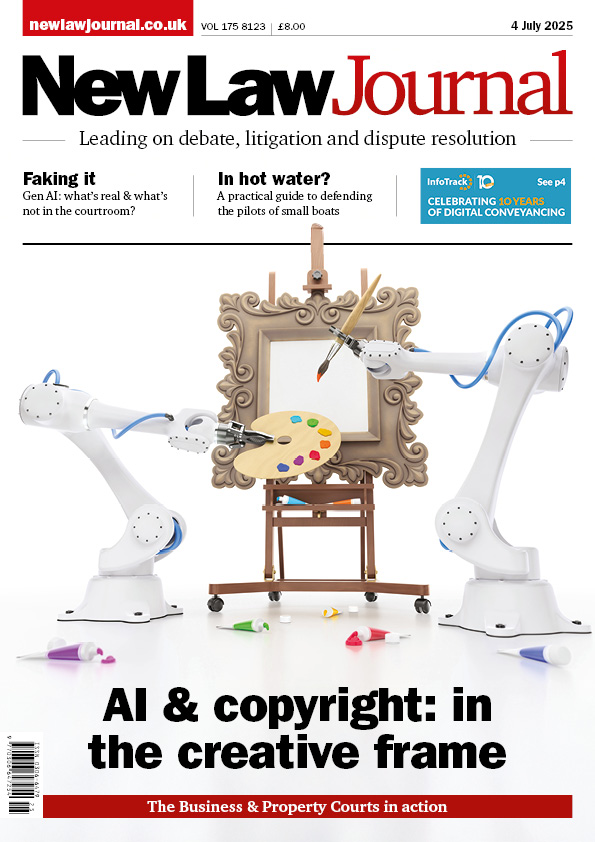THIS ISSUE

Aneurin Brewer sets out a practical guide to defending the pilots of small boats following the Nationality and Borders Act 2022
There is a growing threat of forged evidence in civil litigation—now supercharged by generative AI—which Ian Gascoigne of LexisNexis explores in this week’s NLJ
Writing in NLJ this week, Ben Travers of Foot Anstey examines the unresolved legal tensions at the heart of AI-generated content, following the high-profile Getty v Stability AI case. Although the primary copyright claim was dropped, Travers argues the core issues remain: can AI be trained on copyrighted material without permission, and who owns the output?
The volunteer judiciary has faced neglect. Tom Franklin explains why addressing this is important—for all parts of the legal system
Writing in NLJ this week, Elizabeth Rimmer of LawCare urges legal leaders to embed mental health into the core of organisational strategy
Could social media platforms be treated as ‘products’ under the Consumer Protection Act 1987? If so, they could face strict liability for harms caused by addictive design features and algorithmic manipulation, says Harry Lambert of Outer Temple Chambers, writing in NLJ this week
Kris Kilsby explains how to avoid third-party challenges under the Solicitors Act
In the second part of this series, Harry Lambert tackles some key questions: is social media a ‘product’ at all, and how might claims be brought against its platforms?
There is an urgent need to support England and Wales’s 14,000 volunteer magistrates, according to Tom Franklin of the Magistrates’ Association, writing in this week’s NLJ
Edward Blakeney and Ashpen Rajah of Falcon Chambers unpack the Court of Appeal’s decision in White v Alder [2025] EWCA Civ 392 in this week’s issue of NLJ. The ruling confirms that boundary demarcation agreements bind successors in title—regardless of whether they knew of the agreement when purchasing
MOVERS & SHAKERS

Keystone Law—Milena Szuniewicz-Wenzel & Ian Hopkinson
International arbitration team strengthened by double partner hire

Coodes Solicitors—Pam Johns, Rachel Pearce & Bradley Kaine
Firm celebrates trio holding senior regional law society and junior lawyers division roles

Michelman Robinson—Sukhi Kaler
Partner joins commercial and business litigation team in London
NEWS
The government has pledged to ‘move fast’ to protect children from harm caused by artificial intelligence (AI) chatbots, and could impose limits on social media as early as the summer
All eyes will be on the Court of Appeal (or its YouTube livestream) next week as it sits to consider the controversial Mazur judgment
An NHS Foundation Trust breached a consultant’s contract by delegating an investigation into his knowledge of nurse Lucy Letby’s case
Draft guidance for schools on how to support gender-questioning pupils provides ‘more clarity’, but headteachers may still need legal advice, an education lawyer has said
Litigation funder Innsworth Capital, which funded behemoth opt-out action Merricks v Mastercard, can bring a judicial review, the High Court ruled last week







